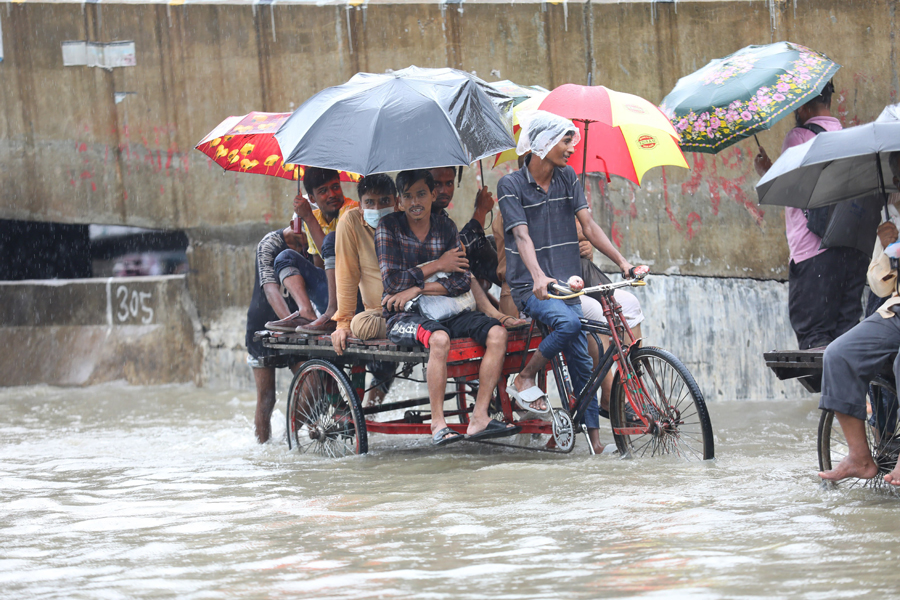
Published :
Updated :

The port city of Chattogram has been becoming increasingly uninhabitable because of frequent water-logging. Every time there is a moderate to heavy downpour, the city goes under knee-to-waist-deep water, disrupting the city life, and causing immense suffering to the commuters. City-dwellers, especially those who live on the ground floor and in lowland areas, are particularly vulnerable to the increased risk of disruption in normal life, damage to property, loss of life, impaired livelihoods and contracting waterborne diseases from sewers during water-logging.
Reportedly, four projects aimed at eradicating the chronic water-logging crisis in Chattogram have been underway for the past 5 to 11 years. These projects, with a combined budget of Tk 143.49 billion, have already consumed Tk 83.12 billion. Despite this substantial expenditure, the water-logging problem in Chattogram is not only persisting but also getting worse with both the frequency and severity of water-logging increasing significantly. Areas that were previously inundated with waist-deep water are now experiencing chest-deep flooding. Moreover, stagnant rainwater that used to recede within hours now remains for days.
Against this backdrop, the initiative taken by the interim government to address Chattogram's water-logging problem before the onset of the monsoon season is commendable. Lack of coordination among different project implementation agencies, flawed project design, failure to evict canal and river encroachers, and slow fund disbursement have been identified as the main causes of the projects' failure to yield the desired results. If these issues are not resolved quickly, there is little chance of reducing inundation even in the next monsoon season.
Natural factors such as intense rainfalls and simultaneous high tides in Karnaphuli River during a full moon cause water-logging in Chattogram. But the problem is compounded by a host of man-made factors. For example, the city was once dotted with many small and large ponds that served as a reservoir for rainwater. But over the decades, the majority of those have been wiped off the map in the name of progress for building infrastructures like residential buildings, shopping malls, and schools. As a result, rainwater has no escape, causing water-logging on roads and houses, shops, and offices on street level getting inundated.
Then, in the absence of proper monitoring and compliance with laws, at least a dozen canals of the port city have been fully or partially occupied by powerful quarters, while the remaining ones are clogged with trash and debris. The CCC had prepared a list of over 2000 canal grabbers in 2017, but no action was taken against them. Their only punishment was being named on the list. It is about time to go after all illegal encroachers.
Meanwhile, the mindless cutting of hills for constructing roads or housing is another manmade factor that leads the sandy soil to roll down to drains and canals with rainwater, eventually clogging them. The government said it has instructed to stop cutting hills, but it will be an uphill task. The authorities, therefore, should also focus on setting up silt traps at the entrances of the drains and canals.
The city's waste management is also in a mess. Reckless dumping of household wastes on roadsides especially plastic bags, which eventually find their way to drains and canals, is also responsible for chocking the drainage system. So, the city's water woes are attributable entirely to the wrongdoing of a few, but suffered by all.
A short-time fix will not work to overcome the crisis. A paradigm shift in the urban development policy will be needed. As urban areas are being expanded haphazardly by occupying every inch of available open spaces and wetlands surrounding the city, the intensity of waterlogging may worsen even more in the future. The city, therefore, must be developed following a proper master plan, keeping adequate space for greenery and absorption of rainwater. Plus, drainage systems and waste management systems must be improved dramatically, occupied canals must be reclaimed, and ongoing projects under different agencies must be well-coordinated to eliminate the menace of waterlogging.
aktuhin.fexpress@gmail.com


 For all latest news, follow The Financial Express Google News channel.
For all latest news, follow The Financial Express Google News channel.